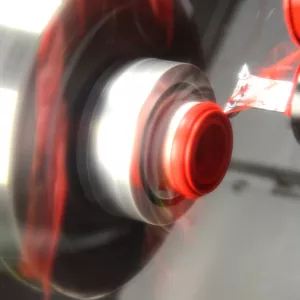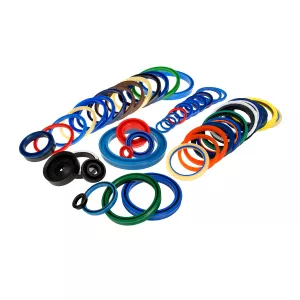What are Static Seals?
Static seals are essential components used to prevent the leakage of fluids or gases between stationary surfaces. Unlike dynamic seals, which are used in applications involving relative motion between components, static seals remain fixed in place, creating a barrier between two non-moving surfaces. They are designed to maintain a reliable and leak-free interface under various operating conditions.
How Do Static Seals Work?
Static seals use various materials and designs to fill the gaps and imperfections between the mating surfaces. When compressed between the two surfaces, they form a barrier that stops fluids or gases from passing through. The effectiveness of the seal is determined by factors such as material properties, compression, and force.
Types Of Static Seals
Gaskets: These are flat or profiled rings made from materials like rubber, cork, metal, or paper, commonly used to create a dependable, leak-free seal for applications such as engines, pumps, and pipe flanges.
O-ringsThese are circular rings made from elastomers such as nitrile, silicone, or Viton. They are commonly used in hydraulic and pneumatic systems.
Metal seals & Washers: These are typically made of copper, stainless steel, or aluminium, and are commonly used for high-temperature or high-pressure applications.
Lip seals: These are expertly designed to seal around a shaft or rod securely to prevent fluid or gas leakages. They are commonly used in engines, gearboxes, and hydraulic systems.
Diaphragms: These are flexible seals that move in response to changes in pressure or fluid flow. They are commonly used in pumps, valves, and regulators to ensure smooth operation.
Bellow seals: These are accordion-like seals that can expand and contract to accommodate changes in temperature or pressure. They are commonly used in valves, pumps, and other high-pressure applications.
Factors To Consider When Choosing Static Seals
When choosing static seals, several factors need to be considered to ensure they meet the specific requirements of the application and provide effective sealing. Here are the key factors to consider:
Material Compatibility: The seal material should be compatible with the fluids or gases it will meet. Different chemicals and environmental conditions can cause materials to degrade, swell, or become brittle, leading to seal failure.
Temperature and Pressure: Static seals must be capable of withstanding the operating temperature and pressure of the application. Higher temperatures and pressures may require seal that can handle the heat and pressure without breaking down.
Chemical compatibility: It is another key consideration when selecting static seals. Different materials are compatible with different types of chemicals, so it's important to choose a seal material that is resistant to the chemicals it will meet.
Size and Shape: The seal must fit accurately within the designated space and match the required shape. Custom seals might be necessary for non-standard applications.
Benefits Of Using Static Seals
Static seals offer several benefits in various engineering and industrial applications. Here are some of the key benefits of using static seals:
Leak Prevention: The primary function of static seals is to prevent the escape of fluids or gases, such as liquids, oils, gases, or chemicals, from one side of the seal to the other. By creating a reliable barrier, they help maintain system integrity and prevent contamination.
Cost-Effectiveness: Static seals are typically simpler in design and easier to manufacture compared to dynamic seals, which require more complex mechanisms to accommodate relative motion. This simplicity often translates to lower production costs.
Easy Installation: Since static seals do not require complex moving parts, their installation is often straightforward. They can be fitted in place with basic tools, reducing downtime during maintenance or repairs.
Wide Range of Materials: Static seals can be made from various materials, such as rubber, silicone, metal, plastics, or composite materials. This versatility allows the seals to be tailored to specific applications, considering factors like temperature, pressure, chemical compatibility, and environmental conditions.
Temperature and Pressure Resistance: Static seals are designed to withstand a wide range of temperatures and pressures, making them suitable for use in both low and high-pressure systems, as well as extreme temperature environments.
Reduced Wear and Tear: Static seals experience minimal wear compared to dynamic seals because they are not subject to friction and movement. This leads to longer service life and less frequent replacement, resulting in cost savings over time.
If you require any further advice regarding Static Seals and their applications, then our knowledgeable team at FPE Seals would be happy to help.
We stock, source, and supply a fully range of Static Seals. Can’t find what you’re looking for? We can also manufacture the seals to your specification, in a full range of materials to meet your exact requirements.



